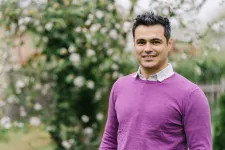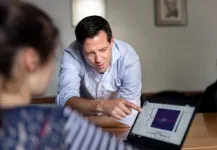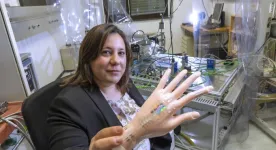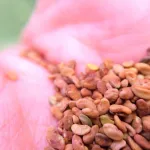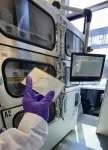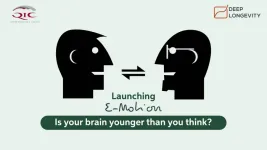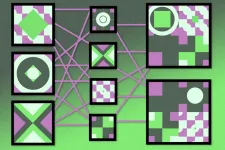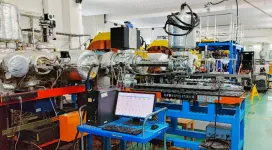(Press-News.org) Two researchers from the University of Bonn have been awarded a Proof of Concept Grant by the European Research Council (ERC) as part of a program designed to help researchers translate their ideas from previous ERC projects into commercial applications. Biologist Prof. Dr. Bernardo S. Franklin from the University Hospital Bonn and physicist Prof. Dr. Simon Stellmer will thus each receive €150,000 over a period of around one year.
Prof. Dr. Bernardo S. Franklin from the Institute for Innate Immunity and the ImmunoSensation2 Cluster of Excellence studies hematopoietic stem cells (HSCs), which develop into different blood cells through processes of cell division and differentiation. “Bouts of inflammation that a person experiences as they get older will damage these stem cells,“ Bernardo S. Franklin says. “Processes like this cause hyperactivation of the innate immune system in the elderly.” This phenomenon, known as “inflammaging,” increases the risk of conditions including cardiovascular disease, diabetes and cancer, he adds.
“Wiping” the immune system’s harmful memories of inflammation
The project that has now secured ERC funding, which is entitled “Nanobodies to prevent hematopoietic stem cell bias and hyper-inflammation” (UNBIAS), aims to return HSCs to their original state in order to “wipe” the immune system’s harmful memories of inflammation. The researchers are using customized “mini-antibodies” known as nanobodies to achieve this. These antibodies, which are very small in relative terms, are taken from the blood of alpacas and can break up the places where inflammation develops.
Back in 2017, Franklin received a much-sought-after Starting Grant from the ERC worth some €1.5 million in funding. The Proof of Concept Grant will now build on this work already done. “Our aim is to validate the use of nanobodies to combat inflammaging and license this technology or its applications for industrial partners,” Franklin says. He believes that the project has the potential to alleviate the effects of inflammation and thus potentially save countless lives and the economic cost of illness.
Developing precise spinning sensors to measure the Earth’s rotation
Together with his team, Prof. Dr. Simon Stellmer from the Institute of Physics at the University of Bonn is studying how measuring devices that are already unbelievably accurate can keep on being improved and refined. In the “GyroRevolution” ERC project, for which they have now secured funding, they want to develop gyroscopes – spinning sensors that are extremely precise. Specifically, gyroscopes are lasers with a ring-shaped trajectory that can be used to measure rotation. Geodesists use them to record the rotation of the Earth and detect earthquakes, for example. Even very tiny and extremely slow movements of structures or the soil can also be measured.
Stellmer and his team used technologies borrowed from quantum physics to develop their gyroscopes. High-stability lasers, optic resonators, frequency combs: originally developed for optical atomic clocks, the researchers’ tools now form the basis for creating improved gyroscopes. The working group is currently exploring several approaches and running several different designs of gyroscope, the largest of which measures 4 m by 4 m and is installed deep in the bowels of the Institute of Physics.
“We want to build small yet sturdy spinning sensors that can be fitted inside buildings or sunk into holes,” says Simon Stellmer, a member of the Matter and Light for Quantum Computing (ML4Q) Cluster of Excellence and the Matter Transdisciplinary Research Area at the University of Bonn. “Earthquakes, climate change, crumbling bridges on the freeway—there are various ways these gyroscopes could be used, all of them highly relevant to society.”
Even back when he was working on his ERC Starting Grant project, which secured its funding in 2017, Simon Stellmer was investigating precision measurements of this kind. In this project, he is addressing a very fundamental question: Why does the universe contain matter in the first place? His aim is to answer questions from the world of particle physics using the precision of quantum experiments rather than the high energy of large particle accelerators.
Two Proof of Concept proposals accepted
“We’re delighted that not one but two proposals from the University of Bonn for ERC Proof of Concept Grants have been accepted,” says Sandra Speer, Head of the enaCom Transfer Center at the University of Bonn. The Transfer team at the Faculty of Medicine helped to submit the proposal to the ERC together with enaCom and Research Funding at the University of Bonn in what proved a highly successful collaboration.
Contact:
Prof. Dr. Bernardo S. Franklin
Institute for Innate Immunity
University Hospital Bonn
Phone +49 228 28751981
Email: franklin@uni-bonn.de
Prof. Dr. Simon Stellmer
Institute of Physics
University of Bonn
Phone +49 228 733720
Email: stellmer@uni-bonn.de
END
Two ERC proof of concept grants for the University of Bonn
European Research Council is supporting the journey from basic research to application
2023-05-05
ELSE PRESS RELEASES FROM THIS DATE:
Smart artificial skin in application check stage: Graz University of Technology researcher wins ERC Proof of Concept grant
2023-05-05
Just a few months ago, Anna Maria Coclite and her team from the Institute of Solid State Physics at Graz University of Technology (TU Graz) presented the results of their research as part of Coclite’s ERC Starting Grant project “SmartCore”. They had succeeded in developing the three-in-one “smart skin” hybrid material, which closely resembles human skin by simultaneously sensing pressure, moisture and temperature and converting them into electronic signals. With 2,000 individual ...
Uncovering the mysteries of alfalfa seed dormancy through multispectral imaging analysis
2023-05-05
Alfalfa (Medicago sativa), commonly called the “King of Grass,” is a legume grown in many parts of the world as a source of animal fodder. It is prized in the forage industry for its high protein content and biomass yield. Recently, alfalfa protein has found applications in aquaculture, pet food industry and human diet. Furthermore, it is seen as an environmentally beneficial crop, with positive impacts on biodiversity and soil nitrogen conservation.
Alfalfa produces two seed types—hard and non-hard—with no obvious visible differences. Unfortunately, the hard seeds ...
New concept for lithium-air batteries
2023-05-05
Lithium-air batteries, also known as lithium-oxygen batteries, are candidates for the next generation of high-energy electricity storage devices. Their theoretical energy storage capacity is ten times that of conventional lithium-ion batteries of the same weight, but they are not yet chemically stable enough to provide a reliable solution. Now a newly launched collaborative research project in which a team from the University of Oldenburg, Germany, led by chemist Professor Dr. Gunther Wittstock is participating is testing ...
Study hints at potential for health conditions to be diagnosed earlier
2023-05-05
Conditions such as coeliac disease and Parkinson’s disease could be detected in principle up to 10 years earlier than they are currently, suggests a new study by UCL researchers.
The study, published in the British Journal of General Practice, reviewed existing evidence on how people’s use of healthcare changed in the weeks, months and years ahead of the diagnosis of a range of conditions. This detectable change in healthcare use indicates the condition’s “diagnostic window” – that is, the point at which diagnosis in some patients may theoretically be possible.
While ...
Playing shadow puppets with NASA's Hubble Space Telescope
2023-05-05
Scientists' Hubble Space Telescope observations of the young star, TW Hydrae may signal new planets under construction.
In 2017 astronomers reported discovering a shadow sweeping across the face of a vast pancake-shaped gas-and-dust disk surrounding the red dwarf star. The shadow isn't from a planet, but from an inner disk slightly inclined relative to the much larger outer disk – causing it to cast a shadow. One explanation is that an unseen planet's gravity is pulling dust ...
Aston Medical School given full approval by the General Medical Council
2023-05-05
Aston Medical School has been given full approval by the General Medical Council (GMC), meaning they can award degrees to graduating students for the first time this year.
The Medical School at Aston University completed the GMC’s rigorous quality assurance process, which began in 2016. The decision, ratified by the GMC’s Council, means Aston Medical School can be added to the list of UK bodies able to award a primary medical qualification.
The approval means that from this summer, medical graduates from Aston University will be added to the medical register and will be able to join the UK’s healthcare workforce ...
QIC reshaping mental health landscape with Deep Longevity aging clocks
2023-05-05
QIC-DVP, an entity of Qatar Insurance Group, the leading insurance provider in the Qatar and MENA region, has launched E-Motion with Deep Longevity. It will enable the populace to measure their customers' psychological age, improve mental health, and increase longevity from the comfort of their home.
The assessment-based and AI-powered digital application has been developed with Deep Longevity's Psychological Age . The technology aims to reinforce mental resilience and wellbeing.
Psychological age, calculated using a proprietary ...
Researchers create a tool for accurately simulating complex systems
2023-05-05
Researchers often use simulations when designing new algorithms, since testing ideas in the real world can be both costly and risky. But since it’s impossible to capture every detail of a complex system in a simulation, they typically collect a small amount of real data that they replay while simulating the components they want to study.
Known as trace-driven simulation (the small pieces of real data are called traces), this method sometimes results in biased outcomes. This means researchers might unknowingly choose an algorithm that is not the best one they evaluated, and which will perform worse on real data than the simulation predicted that it should.
MIT researchers ...
How online art viewing can impact our well-being
2023-05-05
Art can have a positive effect on our mood. But does this also work when we look at paintings on a screen? An international research team involving the University of Vienna, the Max Planck Institute for Psycholinguistics in Nijmegen and the Max Planck Institute for Empirical Aesthetics (MPIEA) in Frankfurt am Main decided to investigate this question. The study was funded by the EU Horizon ART*IS Project. The results have now been published as an open access article in the journal Computers in Human Behavior.
240 study participants viewed an interactive Monet Water ...
Precision mass measurements of nuclei reveal neutron star properties
2023-05-05
Researchers at the Institute of Modern Physics (IMP) of the Chinese Academy of Sciences (CAS) and their collaborators recently measured the masses of several key nuclei with high-precision by employing a state-of-the-art storage-ring mass spectrometry technique. Using the new mass data, they investigated X-ray bursts on the surface of a neutron star, thus deepening the understanding of neutron star properties. The study was published in Nature Physics.
Neutron stars are considered to be the densest objects besides black holes. Type-I X-ray bursts, among the brightest stellar ...
LAST 30 PRESS RELEASES:
New knowledge on heritability paves the way for better treatment of people with chronic inflammatory bowel disease
Under the Lens: Microbiologists Nicola Holden and Gil Domingue weigh in on the raw milk debate
Science reveals why you can’t resist a snack – even when you’re full
Kidney cancer study finds belzutifan plus pembrolizumab post-surgery helps patients at high risk for relapse stay cancer-free longer
Alkali cation effects in electrochemical carbon dioxide reduction
Test platforms for charging wireless cars now fit on a bench
$3 million NIH grant funds national study of Medicare Advantage’s benefit expansion into social supports
Amplified Sciences achieves CAP accreditation for cutting-edge diagnostic lab
Fred Hutch announces 12 recipients of the annual Harold M. Weintraub Graduate Student Award
Native forest litter helps rebuild soil life in post-mining landscapes
Mountain soils in arid regions may emit more greenhouse gas as climate shifts, new study finds
Pairing biochar with other soil amendments could unlock stronger gains in soil health
Why do we get a skip in our step when we’re happy? Thank dopamine
UC Irvine scientists uncover cellular mechanism behind muscle repair
Platform to map living brain noninvasively takes next big step
Stress-testing the Cascadia Subduction Zone reveals variability that could impact how earthquakes spread
We may be underestimating the true carbon cost of northern wildfires
Blood test predicts which bladder cancer patients may safely skip surgery
Kennesaw State's Vijay Anand honored as National Academy of Inventors Senior Member
Recovery from whaling reveals the role of age in Humpback reproduction
Can the canny tick help prevent disease like MS and cancer?
Newcomer children show lower rates of emergency department use for non‑urgent conditions, study finds
Cognitive and neuropsychiatric function in former American football players
From trash to climate tech: rubber gloves find new life as carbon capturers materials
A step towards needed treatments for hantaviruses in new molecular map
Boys are more motivated, while girls are more compassionate?
Study identifies opposing roles for IL6 and IL6R in long-term mortality
AI accurately spots medical disorder from privacy-conscious hand images
Transient Pauli blocking for broadband ultrafast optical switching
Political polarization can spur CO2 emissions, stymie climate action
[Press-News.org] Two ERC proof of concept grants for the University of BonnEuropean Research Council is supporting the journey from basic research to application
